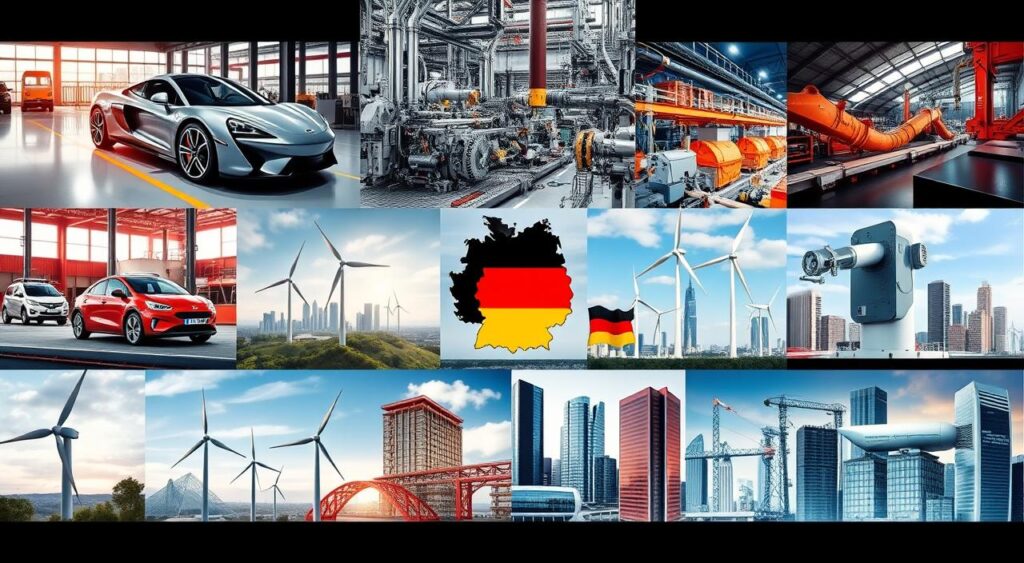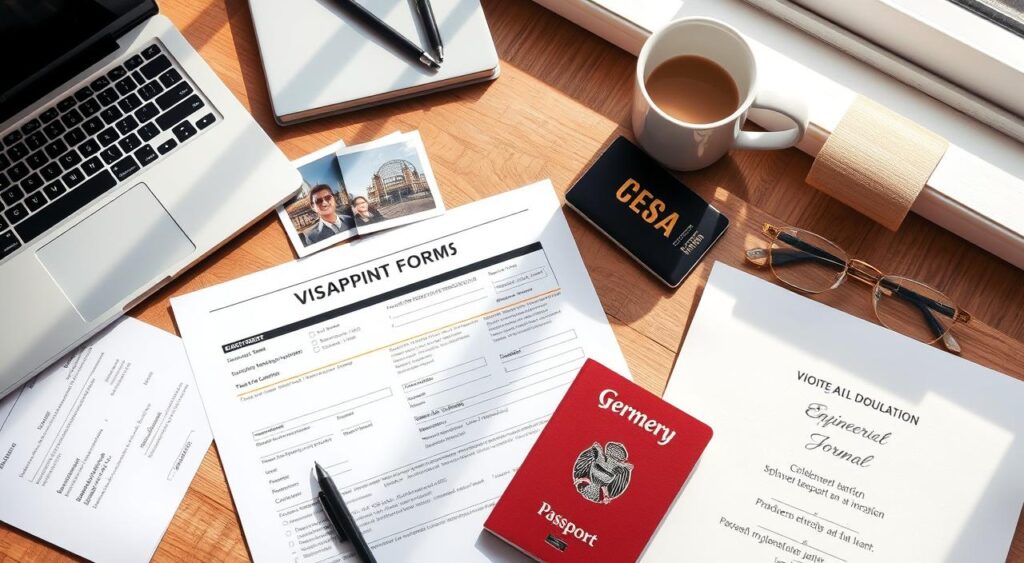
Germany is known for its top-notch engineering, attracting skilled workers worldwide. This guide explores Germany’s engineering world, focusing on visa sponsorship for international engineers. It covers everything from the industry’s main sectors to the visa application steps. You’ll get all the key info to start your engineering career in Germany, a tech leader in Europe.
Key Takeaways
- Discover the diverse engineering sectors and growth areas in Germany’s dynamic industry
- Learn about the visa requirements and application process for engineers seeking employment in Germany
- Explore the visa sponsorship programs offered by leading German engineering companies
- Understand the compensation packages and benefits available to engineers in the German market
- Gain insights into the language and integration support provided to international professionals
Understanding Germany’s Engineering Industry Landscape
Germany is famous for its top-notch German engineering sectors. These include the automotive industry Germany, mechanical engineering, and renewable energy engineering. The country is a leader in technology and innovation. It keeps growing thanks to Industry 4.0 and new market needs.
Top Engineering Sectors in Germany
The automotive industry Germany is a key part of the country’s engineering success. Big names like Volkswagen, Daimler, and BMW are leaders here. But Germany’s engineering talent goes beyond cars. Machine and plant engineering, electrical engineering, and chemical engineering also play big roles.
Current Market Demands and Growth Areas
The world is moving towards green solutions, making renewable energy engineering a fast-growing field in Germany. The country is focusing on wind and solar power. This has led to a big need for skilled engineers in this area. Also, Industry 4.0 is creating jobs for those who know about automation, robotics, and digital systems.
Regional Engineering Hubs in Germany
Germany’s engineering talent is spread across different areas. Cities like Munich, Stuttgart, and Hamburg are known for their engineering skills and innovation. Each city has its own focus and industry groups.

“Germany’s engineering industry shows the country’s dedication to innovation, quality, and technology. It’s a dynamic and varied field that’s changing the global industrial scene.”
German Work Visa Requirements for Engineers
If you’re an engineer wanting to work in Germany, understanding the visa application is key. Germany has several visas for skilled workers, like the EU Blue Card, German skilled worker visa, and residence permit for engineers.
The EU Blue Card
The EU Blue Card is great for top engineers wanting to work in Germany. You need a university degree and a job paying at least €56,400 (2023 rates). You’ll need to send in your degree, job contract, and health insurance details.
German Skilled Worker Visa
The German skilled worker visa is for engineers and other skilled workers. It requires a job that fits your skills and proof of your qualifications. The salary needed is lower than the EU Blue Card, making it more accessible.
Residence Permit for Engineers
Germany also has a special permit for engineers. You need a job in your field and meet certain education and work requirements. You’ll need to provide your qualifications, job contract, and German language skills.
Choosing any visa for Germany can be complex. It’s crucial to know the requirements, prepare all needed documents, and get help if needed. This will help you smoothly start your new job in Germany’s engineering sector.

| Visa Type | Eligibility Criteria | Minimum Salary Threshold |
|---|---|---|
| EU Blue Card | University degree, job offer | €56,400 (as of 2023) |
| German Skilled Worker Visa | Job offer matching qualifications | Varies based on occupation |
| Residence Permit for Engineers | Job offer in engineering field, qualifications | Varies based on occupation |
Engineering Excellence in Germany: Visa Sponsorship Opportunities
Germany is famous for its engineering skills. It has great visa sponsorship programs for talented professionals. These programs let international engineers work with top German companies.
Major Companies Offering Visa Sponsorship
Big names like Siemens, Bosch, and Volkswagen are leading the way. They have strong visa sponsorship programs. They look for global talent to add to their teams.
These companies help international engineers fit right in. They offer full support for visa needs.
Industry-Specific Sponsorship Programs
- The German Electrical and Electronic Manufacturers’ Association (ZVEI) has a visa program for electrical and electronics engineers.
- The German Mechanical Engineering Industry Association (VDMA) helps engineers find jobs in mechanical engineering.
- The German Automotive Industry Association (VDA) offers visa sponsorship for engineers in the automotive and mobility fields.
Qualification Recognition Process
Recognizing international qualifications is key. The Central Office for Foreign Education (ZAB) is crucial in this process. They check if foreign engineers’ qualifications match German standards.
| Qualification Recognition Steps | Documentation Required |
|---|---|
| 1. Submitting Application | Copies of academic transcripts, diplomas, and professional certificates |
| 2. Evaluation by ZAB | Detailed assessment of educational background and work experience |
| 3. Issuance of Recognition Certificate | Official document confirming the equivalence of foreign qualifications |
By going through this process, international engineers can find great jobs in Germany. Their skills are in high demand.
Application Process and Documentation
Getting into the German job market as an engineer needs a smart plan. Start with the application process. A well-made German-style CV is key. It should show off your engineering skills and meet German employer standards.
When you apply for engineering jobs in Germany, you must have the right documents. You’ll need to send in your academic records, professional certifications, and work history. Also, getting a visa from the German embassy is a must for working in Germany.
- Make a German-style engineering CV that highlights your skills and experience.
- Get all the documents needed for your work permit, like academic records and certifications.
- Book a visa appointment at the German embassy in your home country to start the visa process.
- Learn about the German job market and how to apply to boost your chances.
Knowing how to apply for jobs in Germany and what documents you need helps engineers find good jobs. This knowledge is key to success in Germany’s booming engineering field.
| Application Checklist | Description |
|---|---|
| German-style CV | Make your resume fit the German style, focusing on your engineering skills and experience. |
| Work Permit Documents | Collect copies of your academic records, certifications, and work history. |
| Visa Appointment | Book a visa appointment at the German embassy in your home country to start the visa process. |
| Research German Job Market | Learn about the German job market, application rules, and any special needs of certain industries. |
By taking these steps and understanding the application process, engineers can better their chances of finding great jobs in Germany’s growing engineering sector.
Salary Expectations and Benefits for Engineers
Engineering careers in Germany offer great pay and benefits. The country values its engineers highly. It aims to give them a good work-life balance.
Industry Standard Compensation Packages
Engineer salaries in Germany depend on experience, industry, and location. But, the pay is usually good. New engineers can earn between €45,000 and €60,000 a year.
More experienced engineers can make over €80,000. They also get bonuses and profit-sharing. This increases their earnings even more.
Social Security and Healthcare Benefits
Working in Germany as an engineer has many benefits. The social security and healthcare system is strong. It covers retirement, disability, unemployment, and medical costs.
This gives engineers and their families peace of mind. It’s a big plus of working in Germany.
Work-Life Balance in German Engineering Firms
German engineering firms focus on work-life balance. They know happy employees are more productive. They offer flexible work hours and lots of vacation time.
They also support initiatives that help balance work and life. This makes Germany a great place to work for engineers.
“The engineering industry in Germany is not just about technical expertise; it’s about creating a sustainable, balanced lifestyle for its professionals. The emphasis on work-life harmony is truly impressive.”
Language Requirements and Integration Support
As an engineer looking for a job in Germany, knowing German is key. There are many German language courses for engineers. They cover technical terms, work communication, and cultural knowledge. This helps you feel sure in your new job.
Germany also has great support for international engineers. Companies and the government help with many things. They guide you through official tasks, healthcare, and social services. This support makes starting your career in Germany easier.
Big German cities like Berlin, Munich, and Hamburg have strong expat groups. These groups are great for meeting other engineers and making friends. They help you feel part of the German community, making your move worthwhile.
FAQ
What are the top engineering sectors in Germany?
In Germany, the top engineering sectors are automotive, mechanical engineering, and renewable energy. The country leads in advanced manufacturing and Industry 4.0 tech.
What are the current market demands and growth areas in the German engineering industry?
The demand in Germany’s engineering industry is high for green tech, digitalization, and automation. Experts in renewable energy, robotics, and data analytics are in high demand.
What are the major engineering hubs in Germany?
Germany’s engineering hubs are in the south and southwest. Key cities are Munich, Stuttgart, Frankfurt, and Hamburg. These cities are home to major companies in automotive, machinery, and tech.
What are the visa requirements for engineers looking to work in Germany?
Engineers can apply for the EU Blue Card, German skilled worker visa, or residence permit. You need a job offer, meet salary requirements, and have recognized qualifications.
Which companies in Germany offer visa sponsorship for engineers?
Companies like Siemens, Bosch, and Daimler sponsor international talent. They help with the visa application process.
What is the qualification recognition process for engineers in Germany?
The Central Office for Foreign Education (ZAB) evaluates foreign qualifications. This is key for getting a job and visa.
What are the typical salary expectations and benefits for engineers in Germany?
Engineer salaries in Germany are competitive. Packages include bonuses, social security, and a focus on work-life balance.
What language requirements and integration support are available for engineers in Germany?
While German is often needed, many employers provide language courses. They also offer integration programs to help newcomers.







Wow this is amazing
I’m a professional electrician and I’m interested in working with the company please how can I apply?